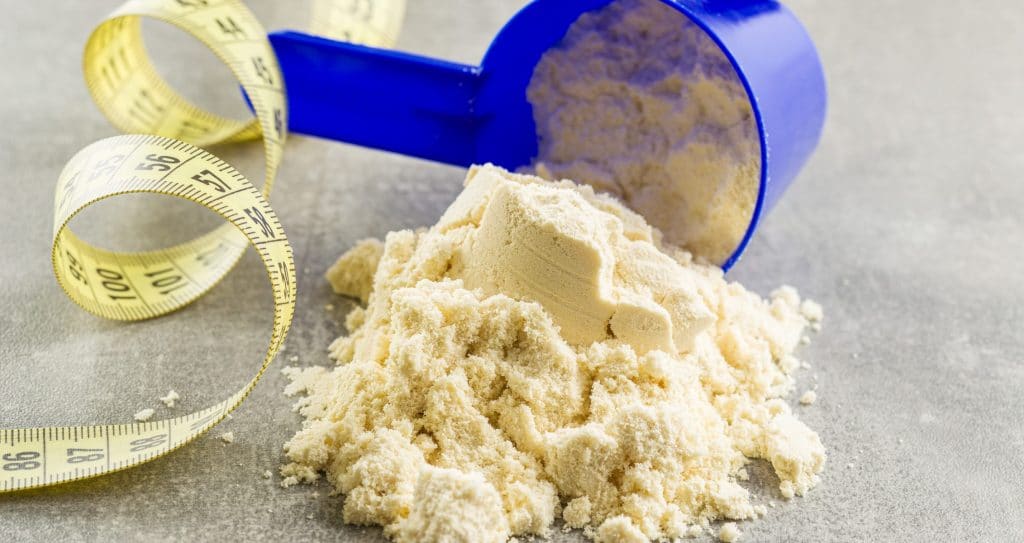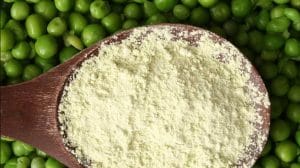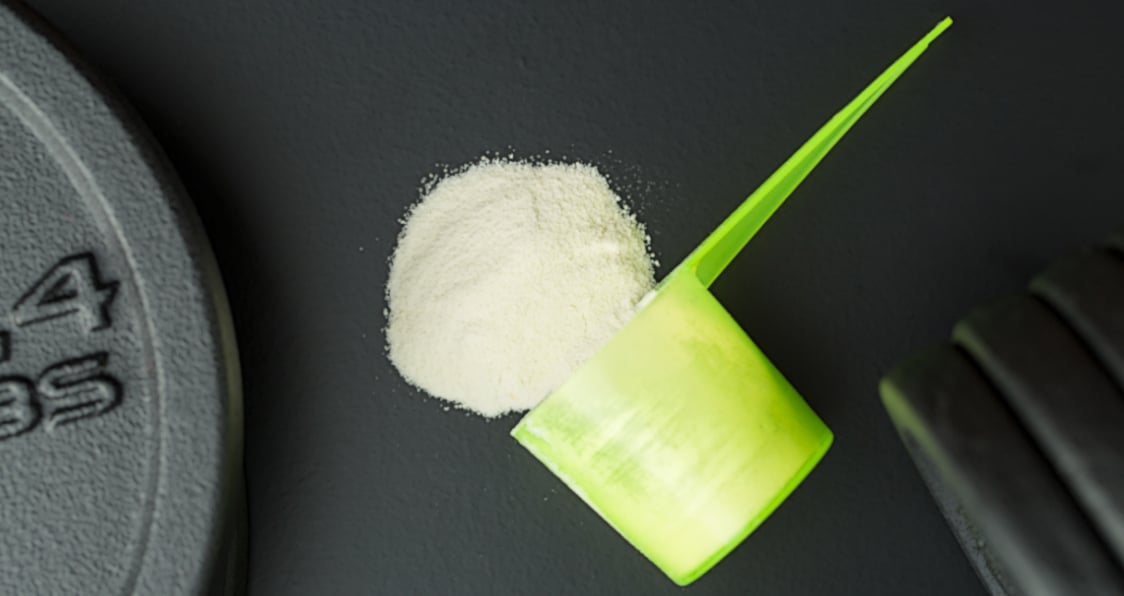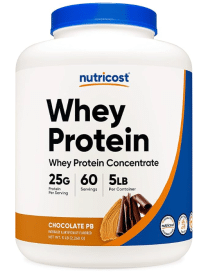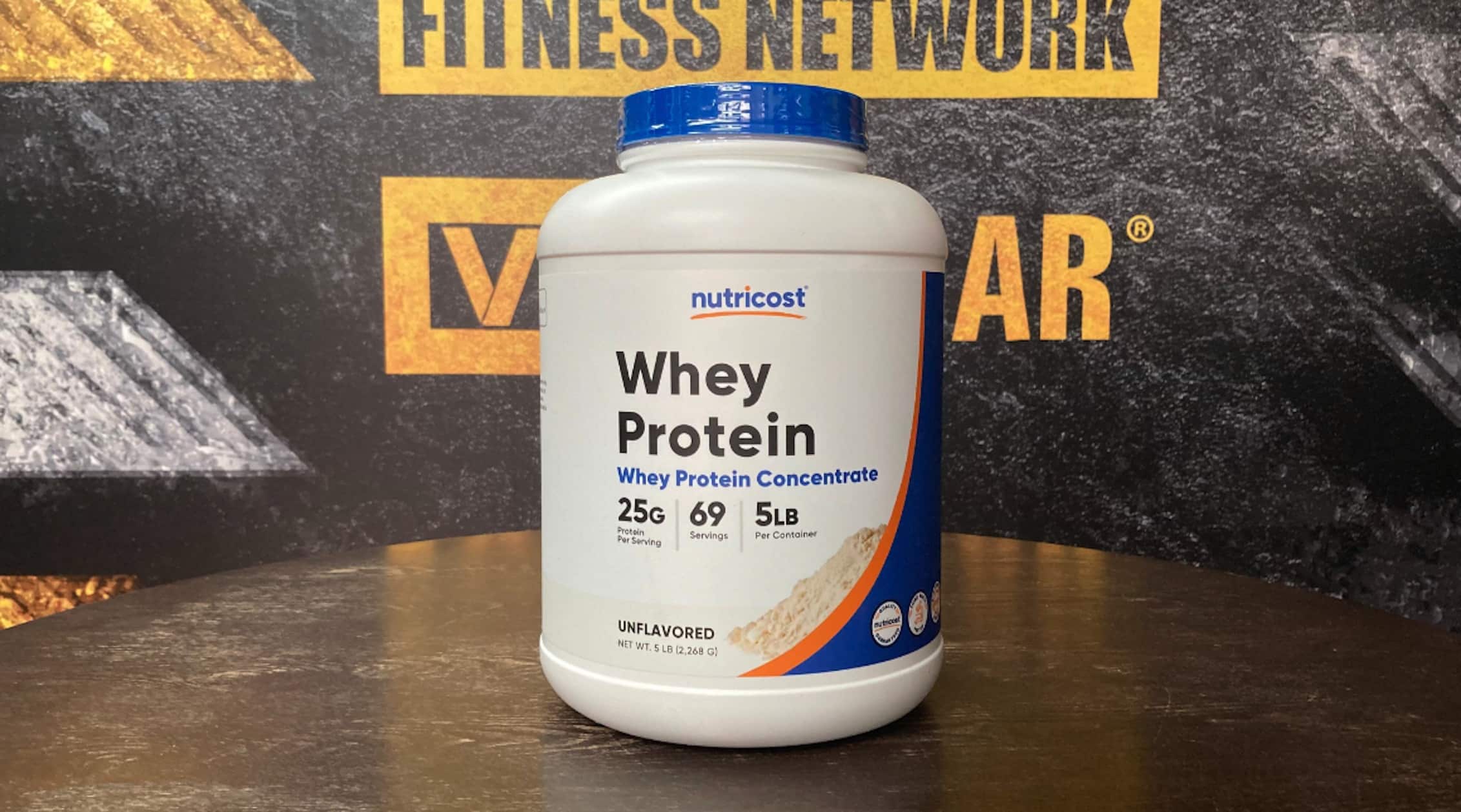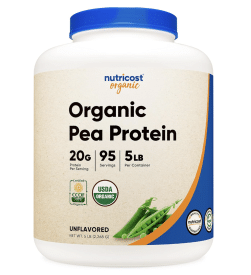We Explain Vegan vs. Whey Protein
Increasing protein intake with powders supports muscle synthesis, essential for muscle growth. Protein, is a crucial macronutrient that can be supplemented in diets through various forms of protein powders. This is especially beneficial for those engaged in strength training. We’re here to compare pea protein vs. whey protein.
The market offers a myriad of protein formulas, among which whey protein derived from cow’s milk stands out for its popularity. Yet, the rise of plant-based proteins marks a significant trend. In this post, our experts examine and compare pea protein, a notable plant-based option, with whey protein, and assess whether it matches or surpasses the benefits of its animal-based counterpart.
What Is Pea Protein?
Pea protein comes from yellow split peas that get dried and ground into powder. Pea protein has an advantage over other plant proteins because it contains nine essential amino acids. Pea protein is also more suitable for people on a plant-based diet.
It comes either as a concentrate or as an isolate. The isolate variation has higher protein as its production process involves eliminating fat and carbs while leaving fiber and protein. Pea protein has a grainy texture and earthy flavor to it.
What Is Whey Protein?
Whey protein is a by-product of the cow-milk cheese-making process. It also contains all nine essential amino acids. However, it contains lactose sugars, which can cause problems in dairy-sensitive people.
Whey protein can be concentrated, isolated, or hydrolyzed. The concentrate form is higher in milk sugars and fat, while the isolate is free of many nonprotein components. Whey hydrolysate is the most expensive form and has a protein content of up to 99%.
Comparing Pea Protein Vs. Whey Protein
They both contain the nine essential amino acids the human body can’t produce independently. However, whey protein comes from cow milk and has higher potassium and calcium levels. Pea protein, conversely, is a richer source of iron and fiber. Let’s compare these two.
Nutrient Profiles
They’re comparable in nutritional content. Using the USDA’s and details, here’s what you get from a 30-gram scoop of each (1,2).
| Pea Protein | Whey Protein | |
| Calories (Kcal) | 120 | 118 |
| Proteins(g) | 22.5 | 27 |
| Carbs(g) | 1.5 | 1 |
| Fat(g) | 2.25 | <1 |
| Fiber (g) | 1.5 | 0 |
| Sugar(g) | 0 | 0 |
| Cholesterol(g) | 0 | 10.8 |
| Potassium(mg) | 31.5 | 116.2 |
| Calcium(mg) | 87 | 129.6 |
| Sodium(mg) | 345 | 48.3 |
| Iron(mg) | 7.5 | 0 |
The above stats show that while both are rich in protein, pea protein slightly outperforms whey protein. However, the exact content of it may vary depending on the brand, so ensure that you read the label. Both proteins are also low in fat and carbohydrates in their organic state.
Pea protein is richer in iron and fiber, while whey protein has more calcium and potassium than cow’s milk. However, pea protein is high in sodium, so whey protein may be the better option to avoid too much sodium.
Amino Acid Content
Pea protein and whey protein contain nine essential amino acids. However, pea protein is slightly lower in the amino acid methionine than the complete amino acid profile. Here’s a table showing how both proteins compare to the full protein profile from this PubMed study (3).
| Amino Acid | Complete Protein Min % | Pea Protein(%) | Whey Protein(%) |
| Histidine | 1.8 | 2.5 | 1.7 |
| Isoleucine | 2.5 | 4.8 | 6.4 |
| Leucine | 5.5 | 8.5 | 10.6 |
| Lysine | 5.1 | 7.5 | 9.6 |
| Methionine | 2.5 | 1.9 | 4.4 |
| Phenylalanine | 4.7 | 5.5 | 5.6 |
| Threonine | 2.7 | 3.7 | 6.7 |
| Tryptophan | 0.7 | 1 | 1.4 |
| Valine | 3.2 | 5 | 5.9 |
Protein Quality
While pea protein and whey protein are rich sources, the type of protein they contain differs. In general, animal proteins are more digestible than plant proteins. The Protein Digestibility Corrected Amino Acid Score (PDCAAS) measures this. While whey protein has a 100% score, pea protein in its concentrate form scores 89%—all plant proteins except soy protein isolate score below 100% on this scale.
Effectiveness for Muscle Growth
According to research, pea and whey proteins give similar outcomes for muscle gain in the pea protein vs. whey protein debate. (4). However, whey protein is richer in leucine, which, when rapidly digested, could stimulate muscle increases faster. Just note that protein consumption must be in addition to regular training for results.
Weight Loss
Pea and whey protein could affect your appetite and satiety (fullness). These two metrics can aid in your weight loss journey. However, this study shows that pea protein has a stronger effect on reducing your appetite than whey protein (5). The higher fiber content of pea protein could explain this, but further research is necessary.
Taste
Pea protein blends well but is grainier than whey protein. Blending with a creamy base like milk can smooth out its texture, but it could add calories to your drink. Pea protein also naturally tastes chalky and bitter.
Whey protein blends well with water and has a milky flavor. In its natural form, it’ll taste like watered-down milk. Thanks to science, there are multiple brands with multiple flavors for both proteins, so this isn’t necessarily a problem.
Allergens
Pea protein is dairy-free, gluten-free, and vegan. This means you can consume it on any diet as it is primarily allergen-free. However, children allergic to tree nuts and legumes have reacted to it, so if you fall into that category, you should proceed cautiously.
Anyone with milk allergies should avoid whey protein, as it comes from cow’s milk. It could also contain gluten, except when the brand has removed and expressly stated it. However, whey processing removes almost all the lactose, so whey protein might not affect people who are lactose intolerant.
The Best Whey Protein Powder
We wouldn’t be talking about pea protein vs. whey protein without giving you an example of which protein powder we recommend.
Looking for a cheap whey protein concentrate? Check out Nutricost Whey Protein Concentrate! A quality protein supplement at half the cost.
Nutricost Whey Protein Concentrate is a cost effective, cheap whey protein powder supplement that does what you need it to do. Though it may not be as expensive as some other options, it is still tasteful, filled with quality ingredients, mixes well in your shaker cup, and can truly help you to make gains.
Check out the full review for Nutricost Whey Protein Concentrate here!
The Best Pea Protein Powder
Now that we have given you the best option for a whey protein powder, let’s take a look at our favorite pea based protein powder.
Pea protein is a great option for those who do not want animal based products and prefer a vegan diet. That being said, Nutricost Pea Protein is a great option!
Nutricost Pea Protein is a premium pea protein powder that is specifically formulated to provide athletes, fitness enthusiasts, and individuals with a plant-based protein option. It is made from organic pea protein powder, making it a suitable choice for vegans and vegetarians. With its high protein content, Nutricost Pea Protein Isolate is an excellent addition to any sports nutrition regimen.
Check out the full review for Nutricost Pea Protein here!
Bottom Line
So, which one reigns supreme in the pea protein vs. whey protein debate? Pea protein and whey protein offer high protein content with low levels of carbs and fats, making it challenging to declare a clear winner. Ultimately, the choice may boil down to personal preferences, so we’ve detailed the distinctions below to assist in your decision-making process.
Whey protein is renowned for its pleasant natural taste and superior digestibility. It boasts a higher leucine content, accelerates muscle growth, and is enriched with essential nutrients like calcium and potassium. Moreover, its popularity ensures a wide variety of flavor options.
On the other hand, pea protein stands out for being free from the most common food allergens, making it an ideal choice for vegans. It also includes a small amount of fiber, potentially enhancing satiety and aiding in weight management. Both proteins excel in promoting muscle growth and size enhancement.
Follow us on Instagram, Facebook, and Twitter for more supplement information!
References
- FoodData Central. (n.d.). Retrieved from https://fdc.nal.usda.gov/fdc-app.html#/food-details/1162804/nutrients
- FoodData Central. (n.d.-b). Retrieved from https://fdc.nal.usda.gov/fdc-app.html#/food-details/1162800/nutrients
- Joy, J. M., Lowery, R. P., Wilson, J. M., Purpura, M., De Souza, E. O., Wilson, S. M., Kalman, D. S., Dudeck, J. E., & Jäger, R. (2013). The effects of 8 weeks of whey or rice protein supplementation on body composition and exercise performance. Nutrition journal, 12, 86. https://doi.org/10.1186/1475-2891-12-86
- Banaszek, A., Townsend, J. R., Bender, D., Vantrease, W. C., Marshall, A. C., & Johnson, K. D. (2019). The Effects of Whey vs. Pea Protein on Physical Adaptations Following 8-Weeks of High-Intensity Functional Training (HIFT): A Pilot Study. Sports (Basel, Switzerland), 7(1), 12. https://doi.org/10.3390/sports7010012
- Abou-Samra, R., Keersmaekers, L., Brienza, D., Mukherjee, R., & Macé, K. (2011). Effect of different protein sources on satiation and short-term satiety when consumed as a starter. Nutrition journal, 10, 139. https://doi.org/10.1186/1475-2891-10-139
